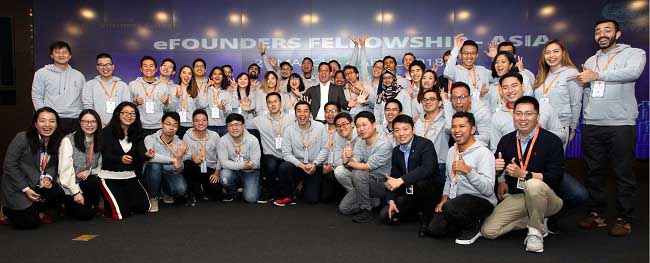The United Nations Conference on Trade and Development UNCTAD and Alibaba Business School today enrolled the first class of 37 Asian entrepreneurs for the eFounders Initiative at an opening ceremony held on the Alibaba campus in Hangzhou, China.
The 11-day course is part of a commitment by Jack Ma, Alibaba Group’s founder and Executive Chairman and UNCTAD Special Adviser, to empower 1,000 entrepreneurs from developing countries in five years.
The launch of the first program for Asian entrepreneurs comes after the success of the inaugural class for 24 African participants last November.
Following a rigorous selection process, the final candidates from Cambodia, Indonesia, Malaysia, Pakistan, the Philippines, Thailand and Vietnam will embark on an11-dayintensive course providing first-hand exposure to e-commerce innovations from China and around the world and become eFounders Fellows.
Eventually these young entrepreneurs will become catalysts in their home country that willspur the digital transformation of their economies.
Smart partnerships
“We want to reach out to youth and include them in the work we do for inclusive and sustainable economic growth,” Arlette Verploegh, Coordinator for the eFounders Initiative at UNCTAD, said. “The initiative is aboutb ridging the digital divide for young entrepreneurs and unlock their potential. It is part of a set of smart partnerships UNCTAD is creating to reach the sustainable development goals.”
All participants are founders of their respective start-up companies, ranging from e-commerce, big data, logistics, fintech, payment and tourism.
“We are excited to extend this fellowship to entrepreneurs from Asia for the very first time as part of our commitment to empower digital champions and communities around the world,” said Brian A. Wong, Vice President of Alibaba Group, who heads the Global Initiatives program.
“Our goal is to inspire entrepreneurs to serve as pioneers for building a more inclusive development model that is not just good for their business, but also good for society by creating platforms that all can participate in and benefit from.”
Under the auspices of the 2030 Agenda for Sustainable Development, the initiative is aligned with the wider call to action to ensure that no one is left behind in the digital economy, and to help bridge the digital divide faced by businesses in emerging markets.
Jointly organized by UNCTAD and Alibaba Business School, the eFounders Initiative also supports Alibaba’s mission to help small businesses succeed in their home markets and beyond. It was first announced in 2017 by Jack Ma in his capacity as the UNCTAD Special Adviser for Young Entrepreneurs and Small Business when he, together with Dr.Mukhisa Kituyi, Secretary-General of UNCTAD, visited Africa.
E-commerce ecosystems
The participants of the eFounders Initiative will learn first-hand the transformative impact e-commerce and technology have on society in China and participate in lectures and discussions with local practitioners and executives to identify the lessons that can be applied to their own markets. Topics covered will include e-commerce, payment, logistics, big data and tourism from Alibaba Group and other successful companies in the e-commerce value chain, with sessions touching on digital finance, smart logistics and rural e-commerce development, among others.
Upon graduation, participants will officially become Fellows of the eFounders Initiative and make formal commitments on how they will apply the learning from this program. As part of the wider eFounders Initiative community of promising young entrepreneurs around the world, UNCTAD and Alibaba Group will also continue to advise on and provide support for the creation of e-commerce ecosystems jointly with other stakeholders.
The first class of eFounders Fellows – 24 entrepreneurs from Africa – completed the program in November 2017 after a similar two week intensive workshop in Hangzhou.
To continue the impact of the initiative, UNCTAD and Alibaba have already completed a full round of follow up meetings with the fellows, each of whom are actively applying what they have learned to their own enterprises, as well as sharing insights with their home communities. Fellows are working toward achieving their commitments and will continue to check in with UNCTAD and Alibaba every three months.




